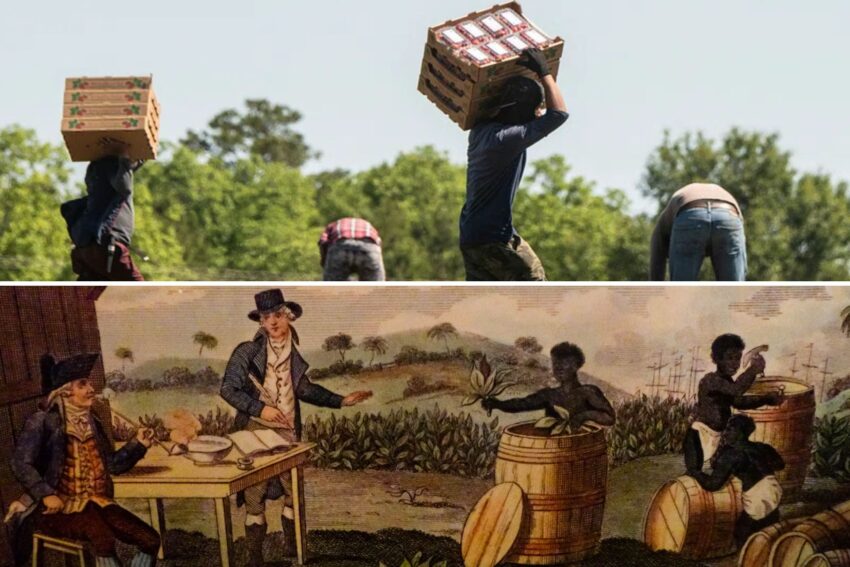In an echo of the past, the modern-day debate over the mass deportation of illegal immigrant workers in the agricultural sector starkly parallels the historical resistance of plantation owners to the abolition of slavery. Although slavery was once legally sanctioned, the current scenario involves the flagrant violation of labor and immigration laws. Here’s a critical look at how these practices mirror each other, and why it’s time for a significant shift in American agriculture.
Historical Echoes in Modern Practices
Much like the plantation owners of the antebellum South who argued that their economy would collapse without slave labor, big agribusinesses today claim that their operations would be unsustainable without the undocumented workforce. This argument hinges on the assertion that no legal workers are willing to perform the grueling farm labor. However, the underlying truth is not about the willingness to work, but rather the unwillingness to work for the wages and under the conditions offered by these companies.
The crux of the matter is clear: these businesses are engaging in illegal practices to exploit a vulnerable workforce. This exploitation is not just a matter of underpaying workers; it often involves human rights abuses, including the use of underage, trafficked workers subjected to brutal conditions, particularly in meat packing plants. And just like with historical slavery, where only the rich few profited, this serves to undercut American workers.
The Legal and Moral Dilemma
The defense of these practices sometimes takes a humanitarian turn, suggesting that these workers should be allowed to continue their ‘under the table’ jobs rather than face deportation. However, this argument fails to recognize the fundamental illegality and exploitation at play. Rewarding illegal behavior sets a dangerous precedent, undermining the rule of law and the integrity of the labor market.
The Impact on Small Farmers
It’s important to note that many small farmers, who are often the backbone of American agriculture, do not partake in these illegal hiring practices. Instead, they operate within the law, often at a disadvantage. Big agribusinesses gain a competitive edge by exploiting illegal labor, which not only impacts the fairness of the market but also puts additional pressure on legal operations to cut corners just to compete.
The Path Forward
To address this issue, several solutions have been proposed:
Mechanization of Agriculture: Investing in technology to automate farming processes can significantly reduce the need for human labor in strenuous tasks. This not only addresses labor shortages but also improves efficiency and safety. The transition might be costly initially, but the long-term benefits in terms of sustainability and reduced dependency on exploitative labor practices are substantial.
Legal and Seasonal Immigrant Labor: Instead of relying on illegal workers, the U.S. could reform its visa programs like the H-2A to be more accessible and less cumbersome for both farmers and workers. This would provide a legal pathway for labor while ensuring workers have rights and protections.
Wage and Labor Reforms: Elevating wages to make farm work more attractive to American citizens could fill labor gaps. This might lead to higher food prices, but it reflects the true cost of ethical production. The American public, having elected a government focused on securing borders and prioritizing citizens, must be ready to bear this cost for the sake of legality and fairness.
Support for Small Farmers: Policy should shift to support small farmers who do not engage in these exploitative practices, perhaps through subsidies or tax incentives for legal labor practices. This would level the playing field and foster a more ethical agricultural sector.
Crackdown on Human Trafficking and Child Labor: There needs to be stringent enforcement of laws against human trafficking and child labor, ensuring that no one is exploited under the guise of necessity.
Conclusion
The current practices of big agribusinesses in employing illegal immigrant labor are not just a violation of law but an echo of historical exploitation where human dignity was secondary to profit. America must prioritize its citizens and the rule of law, embracing innovations and reforms that lead to a sustainable, ethical, and self-sufficient food system. The increased cost of food that might result from such changes is a small price to pay for upholding legal standards and human rights, ensuring that our agricultural practices reflect our national values of freedom and justice.


